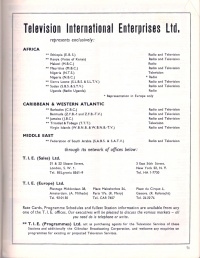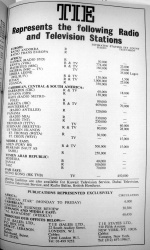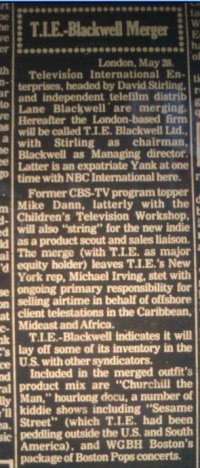TIE Ltd
TELEVISION INTERNATIONAL ENTERPRISES LTD (TIE Ltd)
London-based Television International Enterprises Limited (T.I.E. Ltd) (incorporated in June 1959), its sales subsidiaries Television International Enterprises (Programmes) Ltd, Television International Enterprises (Sales) Ltd, and other associated companies, was an international television programme distribution organisation that was responsible for marketing programmes on behalf of programme makers (including the BBC), and at times distributing film prints to those countries for which it was an agent.
Doctor Who was just one of hundreds of programmes for which it had a contract to promote and sell.
TIE was a regular attendee at television promotion events such as MIP, MIPCOM, and NATPE where distribution deals were made.
 Print ad for TIE Ltd; from WRTH 1966 |
 Print ad for TIE Ltd; from WRTH 1969 |
 Print ad for TIE Ltd; from WRTH 1972 |
TIE Ltd had exclusive rights to distribute to the broadcasters that it served, which meant that when they discontinued selling BBC programmes to those markets in the mid-1970s the BBC could not step in and market to them directly.
(This could in part explain why sale and distribution of the later William Hartnell serials and the complete run of Patrick Troughton stories dropped significantly during the late 1960s and into the 1970s - did TIE Ltd find it difficult to sell the science fiction series, and therefore removed it from its catalogue? Or was it because it had other things to focus on? (see CTW below…) Is this why the markets that picked up the first and second Hartnell seasons did not take up any of the later seasons, because the BBC was unable to "go behind TIE's back" and sell the series to those markets themselves?)
SALES CENTRES
TIE Ltd had a number of subsidiary companies with sales offices around the world – such as TIE States Ltd, operating out of New York City; TIE (Europe) Ltd, which had offices in Geneva, Paris and Amsterdam; and TIE (Sales) Ltd's Middle East office was in Beirut, Lebanon.
In a BBC memo dated 7 July 1965, TIE is recorded as purchasing "prints for showing in Gibraltar, Aden, Trinidad, and Bermuda". The stories sold were the first five only, up to and including The Keys of Marinus. (Of note, Bermuda is not named as having TIE (Programmes) Ltd as a "purchasing agent" in any of the print ads for TIE featured here; did TIE cease acting as the purchasing agent for Bermuda TV after 1965?)
What's not clear is whether there were four sets of the 26 episodes (ie 104 prints in total), or one single set of the 26 that was to be shared. The price recorded for this "sale" to TIE was £75 per print – but the total paid was only £1,587/2/11 (in pre-decimal currency). But whether you calculate using 26 or 104, it does not compute! (£75 x 26 = £1,950; £75 x 104 = £7,800. Was £1,587/2/11 perhaps a 'deposit' payment, with the balance to be paid later?)
The very fact that there is not any overlap in the airdates for those four countries, does suggest that there were not four prints in use; however, in our Bicycling Chains table, we've assumed there would be more than one set in circulation, as later sales to other TIE countries would have to be taken into consideration when planning future bicycling of the film prints.
On the assumption that TIE (Programmes) Ltd circulated one or two sets of prints within each region or continent, some of the following countries might have shared the same prints of Doctor Who:
(*Although strictly speaking it is part of Europe, it's geographical position may have meant that Gibraltar fell under the category of "Africa")
- Bermuda (until 1965 only?)
- Barbados (until 1970 only)
- Trinidad & Tobago
- Jamaica
- Federation of South Arabia (Aden)
- Saudi Arabia
- Abu Dhabi (after 1972)
- Our attempts at tabulating some of these regional circulation paths can be seen on the Bicycling Chains page
Of course, there's no certainty that films were always circulated in this manner. Given that there isn't any cross-over of the airdates within each territory, and in most cases the gap between screenings is usually only a matter of a few weeks apart - which is plenty of time for the films to be shipped between countries to meet the known airdates – there is good reason to assume there was indeed movement of the same sets of prints between some of these countries in the mid-to-late 1960s.
THANKS BE TO TIE
TIE's greatest achievement came in 1971 when it was contracted by the Children's Television Workshop to sell Sesame Street to broadcasters throughout Africa, Europe and the Far East.
(It may be purely coincidental that the final round of sales of Doctor Who to broadcasters that were on TIE's books - such as Sierra Leone and Ethiopia - were in 1970. Did the acquisition of the CTW contract in early 1971 force the distributor to drop or at least minimise its association with the BBC in order to concentrate on promoting Kermit and co around the world?)
In May 1974, TIE Ltd merged with another London-based international TV distributor, Lane Blackwell Limited; the joint-venture becoming TIE-Blackwell Ltd. But less than one year later, in February 1975, this co-venture came to an end. Lane Blackwell went back to distributing programmes on a solo basis.
TIE Ltd also continued distributing for at least another decade but in a much-reduced capacity following a major restructure (for instance, TIE (Europe) Ltd was renamed TIE (Fiji) Ltd in December 1976).
TIE Ltd eventually ceased trading circa 1987. (It had certainly been wound up by the time of the death of its founding-director, Sir David Stirling, who died in November 1990.)
